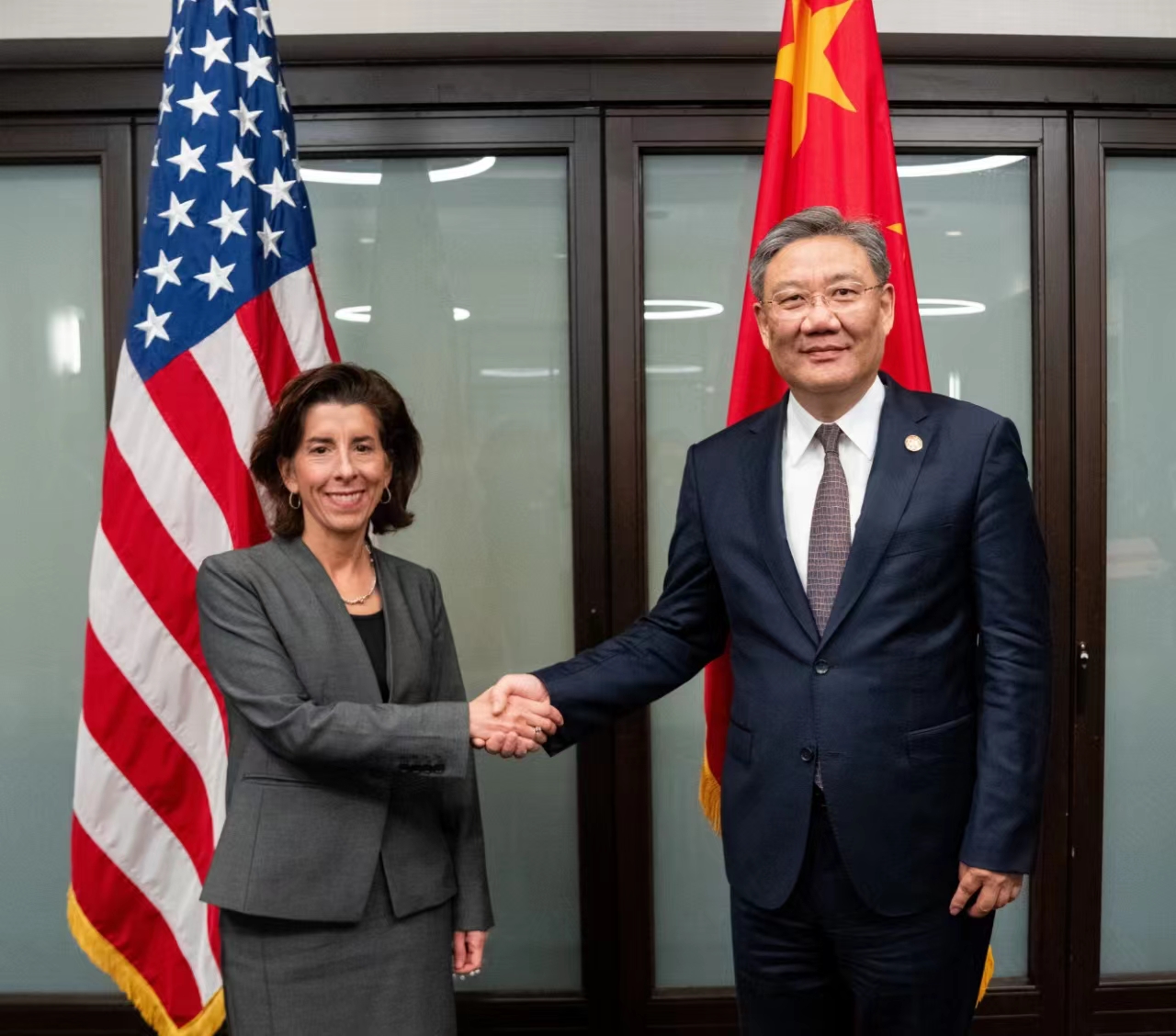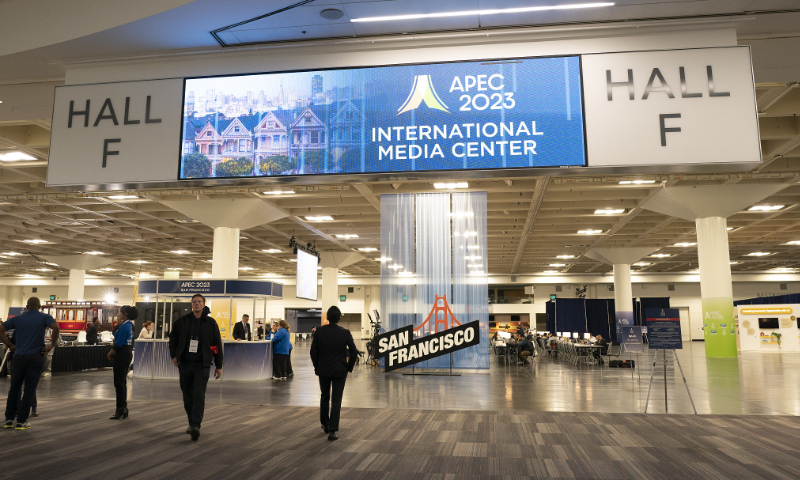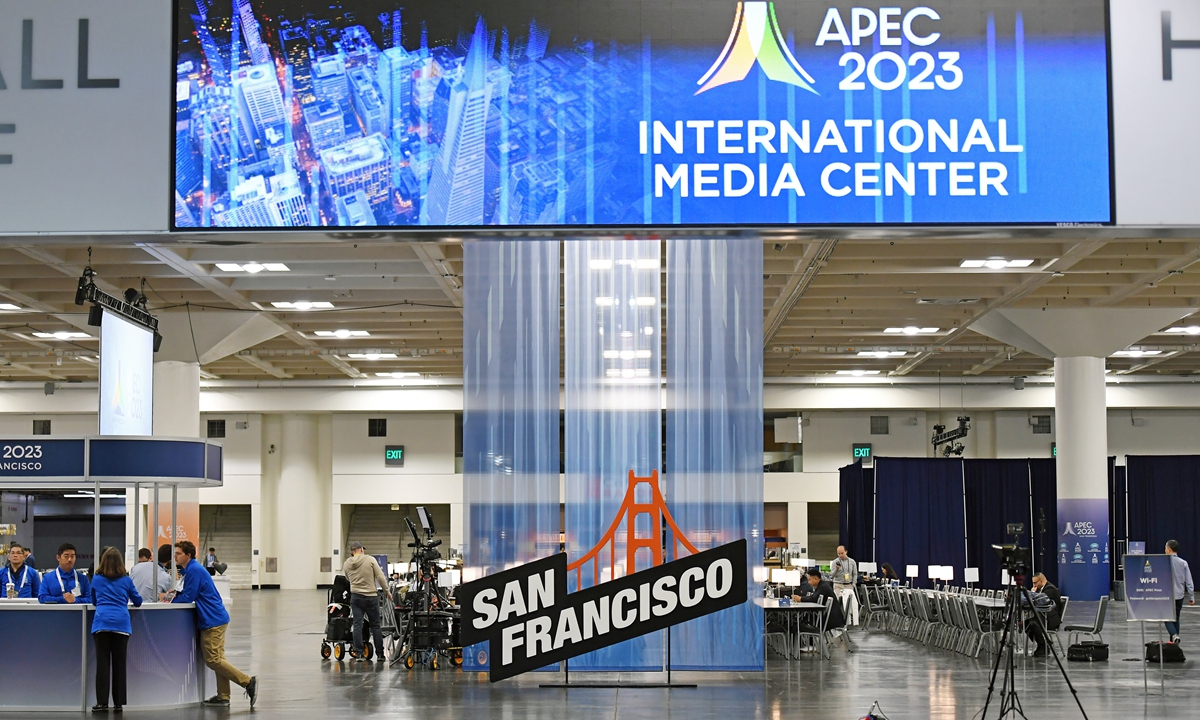Chinese commerce minister urges to discuss boundary of national security in ‘productive talks’ with Raimondo
Nations agree to hold first meeting of trade working group in Q1 2024

China's Minister of Commerce Wang Wentao and US Commerce Secretary Gina Raimondo shake hands. Photo: Ministry of Commerce
China's Minister of Commerce Wang Wentao and US Commerce Secretary Gina Raimondo held the first ministerial-level meeting under the communication mechanism of commerce authorities of the two countries on Thursday in San Francisco, where they engaged in "practical, constructive and productive" communications on China-US economic and trade relations and issues of common concerns.
At the meeting, the officials discussed the implementation of the consensus reached by the two heads of state at their just-concluded summit in San Francisco and covered important issues in bilateral economic and trade relations. They lauded the positive progress made in the commerce field between the two sides and discussed specific problems that the two countries' enterprises are concerned about, according to a statement by China's Ministry of Commerce (MOFCOM).
Observers said positive results from the meeting reflect both sides' willingness and pragmatic need to strengthen economic and trade cooperation amid global uncertainties, and bilateral cooperation is expected to be expanded to a wide range of areas. However, the observers also said challenges persist in China-US economic and trade ties, as the US is unlikely to ease its containment of China's high-tech sector, urging more trust and exchanges to stabilize bilateral ties.
MOFCOM said the two sides agreed to hold the first meeting of the commerce and trade working group at the vice ministerial level in the first quarter of 2024, support the two countries' provinces and states to conduct trade and investment promotion activities, jointly boost cooperation between Chinese and US enterprises to yield material results and set up offices to promote these projects.
Wang stressed that abusing and politicizing the concept of "national security" has affected normal trade and investment and it's important for the two sides to discuss the boundaries of national security on the economic and trade front. Wang raised concerns about issues including US chip export controls on China, sanctions on Chinese enterprises, restrictions on two-way investment and US Section 301 tariffs on Chinese goods.
"As part of the implementation of the consensus reached by the two heads of state, the meeting between Chinese and US commerce ministers underscores both sides' willingness and pragmatic need to strengthen economic cooperation," Liu Weidong, a research fellow at the Institute of American Studies at the Chinese Academy of Social Sciences, told the Global Times on Friday.
He said the US side hopes to export more agricultural and energy products to China and import cheap but quality Chinese goods, while high-level opening-up is necessary for China's high-quality development.
The economic and trade sector is a field where China and the US can reach agreements relatively easily. Starting from this, their cooperation can be extended to other fields, Liu said.
As the two most important economies in APEC, China and the US use the platform to push for reaching consensus, which has a positive significance in helping maintain opening-up within the Asia-Pacific region, Zhou Mi, a senior research fellow with the Chinese Academy of International Trade and Economic Cooperation, told the Global Times on Friday.
The talks between the two commerce ministers provided room for stability in China-US economic and trade cooperation and cooperation in emerging sectors, Zhou said. This innovative way of handling issues of common concerns also serves as a reference for other economies.
Although the US is unlikely to alter its overall approach toward China, more areas of cooperation will lead to more trust and exchanges, and allow decision-makers to make more informed decisions, thus contributing to the stabilization of bilateral ties, Zhou said.
Liu said the US is unlikely to ease its containment of China's high-tech rise, and may even ramp up sanctions and crackdowns as its foreign policy toward China is fundamentally ingrained.
Shared hope
The progress in trade comes only one day after Chinese President Xi Jinping delivered a speech to US communities, most of whom were top US executives, in a welcome dinner held by friendly organizations in San Francisco on Wednesday evening.
The remarks received positive responses from Chinese and American enterprises alike, providing a glimmer of hope for entrepreneurs eager to do business amid turbulent China-US economic and trade relations.
"Dinner was outstanding and I love the meeting; it's so good to see people coming together," Apple's Tim Cook, one of the top executives who attended the dinner, told Chinese media on Wednesday, emphasizing that he already felt the friendship between peoples of the two countries during his previous China visits, and can "always feel it."
In a similar expression of hope, Tesla's Elon Musk tweeted a photo of himself shaking hands with President Xi on Thursday, accompanied by the caption "May there be prosperity for all."
Such events give people from both countries the opportunity to hear directly from Chinese and US government leaders. Constructive communication leads to a more stable and productive US-China relationship and is in the best interests of both countries and the global community, read a joint statement from the US-China Business Council and the National Committee on US-China Relations, who were among the organizers of the meeting.
Meanwhile, Chinese companies are also hoping for further cooperation with signs of thawing relations, though challenges remain.
President Xi's speech points to a direction of win-win cooperation and peaceful development, which will provide opportunities for economic growth for both sides and global economic recovery, giving immense confidence to entrepreneurs, Zhou Hongyi, founder of Chinese cybersecurity company 360 Security Group, told the Global Times.
Zhou especially mentioned the agreement between the two heads of state to promote and strengthen China-US dialogue and cooperation in areas such as AI, which he believed will bring new opportunities for Chinese technology companies in their R&D and application implementation.
"Although barriers are mounting, I still believe that Chinese and American entrepreneurs possess wisdom and courage. They can recognize and seize opportunities, becoming the 'harmonizers' of China-US relations," a company representative from China, who attended the APEC meetings, told the Global Times on Thursday.
"We exchanged tons of name cards during the conference, many of which were from the US. I believe this is the most direct proof showing that more cooperation is what everyone wants," the representative said.
Challenges persist
The meeting between Wang and Raimondo is one of the immediate signs of progress made after the Xi-Biden meeting, during which the two sides reached more than 20 agreements.
The two have also pushed forward exchange and cooperation on national parks and many other areas. The US on Thursday removed the Chinese Ministry of Public Security's Institute of Forensic Science (IFS) from a trade sanctions list, in a bid to move forward with counternarcotics cooperation with China.
Giant pandas, long loved by Americans and a symbol of China-US friendship, could return to US zoos, according to media reports. The US currently has four pandas in Atlanta. The White House said on Thursday the US would welcome back any giant pandas China decides to send.
Despite the positive progress made through the summit of the two countries' leaders and a series of high-level exchanges, experts said challenges persist for China-US economic and trade relations, as the US' foreign policy of "decoupling" from and cracking down on China is fundamentally unchanged.
Applied Materials, the largest US maker of chipmaking machinery, faces a US criminal investigation for allegedly violating export restrictions to China, Reuters reported on Thursday.
Chinese Foreign Ministry spokesperson Mao Ning on Friday urged the US to stop politicization, instrumentalization, and weaponization of economic and technological issues and avoid disrupting global supply chains. Mao stressed China will firmly safeguard its own rights and interests.
How to manage the consequential relationship is not only crucial for the two countries but also important for the world. Starting from San Francisco, whether China and the US can continue to move forward is the real test of the sincerity and determination of the US side, experts said.



